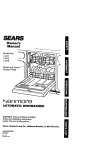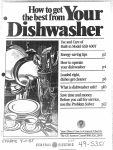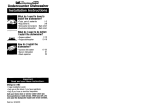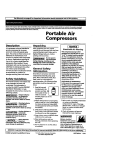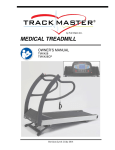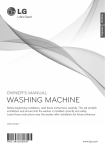Download Sears 14174 Owner`s manual
Transcript
SEARS Owner's Manual Model Nos. 14171 14172 14174 14175 Model and Serial Number Plate AUTOMATIC DISHWASHER CAUTION: Read and follow all Safety Rules and Operating Instructions before first use of this product. Sears, Roebuck 165D3592P060 SR5559-1 5,12 CG Printed in U.S.A. and Co., Hoffman Estates, IL 60179 U.S.A. Warranty ................... Below Important Safety Instructions .. ..... 3 Important Parts of Your Dishwasher What Your Dishwasher Special Tips ................ OPerating Instructions. Detergent Dispenser .......... ............. Detergent Usage Guide Full One.Year Dishwasher _..... .......... Warranty Proper Loading .............. 5 Care and Cleaning .............. 6 Air Gap ....................... 7-9 10 10 Sears Service .................. on Warranty Against Tub and Inner Door ..... 13 13 13 Color Panels ................... Problems and Solutions " 11, . Instructions For one year from the first day of use in your home, Sears will repair, free of charge, defects in material or workmanship which appear in this dishwasher. Full Ten-Year Leaks in the Panel .......... User Maintenance . .4 Needs . .,. .... Rinse Agent Dispenser 14 ....... 15-18 20 The model number of your automatic dishwasher is found on the serial plate fastened to the tub wall just inside the dishwasher door. All repair parts are available for immediate purchase or special order when you visit your nearest Sears Service Center, or the Service Department at most Sears Stores. To request service or order parts by phone, call the toll free number." "d on the back cover. For ten years from the first day of use in your home, if a leak should occur as a When requesting service or ordering p. result of failure of the tub or inner door • always provide the following informatk,. panel due to cracking, chipping, or peeling, Sears will replace, free of charge, the tub • Product Type or inner door panel. • Part Number If the dishwasher is subjected to other than • Model Number private family use, the above warranty • Part Description coverage is effective for only 90 days. Warranty service is available by contacting the nearest Sears Service Center/Department in the United Sta.tes. This warranty applies only while this product is in use in the United States. This warranty gives you specific legal rights, and you may also have other rights which vary from state to state. Sears, Roebuck and Co., Dept. 817WA, Hoffman Estates, IL 60179 WARNING: Please follow these basic precautions, including the following: .rid all instructions before using your lishwasher. Only use detergents and rinse agents recommended for use in a dishwasher. r Store detergents and rinse agents in a cool dry place out of children's reach. Do not tamper with controls. • Do not operate dishwasher unless all enclosure.panels are properly in place. Always disconnect dishwasher before it. We recommend technician service electrical power to attempting to service having a qualified your appliance. • Remember, use dishwasher for its intended purpose only. , Do not wash plastic items unless marked "Dishwasher Safe" or equivalent. If unmarked, check manufacturer's recommendations. , This dishwasher must be properly installed in accordance with the Installation Instructions before it is used. L qOUNDING I,.STRUCTIONS )nnect to a properly rated, protected .nd sized power-supply circuit to avoid electrical overload. , This appliance must be connected to a grounded metal, permanent wiring system; or an equipment-grounding conductor must be run with the circuit conductors and connected to the equipment-grounding terminal or lead of the appliance. A WARNING: The improper connection of the equipment-grounding conductor can result in a risk of electric shock. Check with a qualified electrician or service representative if you are in doubt whether the appliance is properly grounded. • To avoid risk of electrical shock, the dishwasher must be electrically grounded before it is operated. • If you did not receive Installation Instructions with your dishwasher, you can get a copy by contacting your Sears Service Center. • Do not touch heating unit during or immediately after use. Allow time to cool. • Load sharp or pointed tableware with handles up (points down) to avoid injury when reaching into dishwasher. • Load sharp items and knives so they aren't likely to damage door seal. • Do not sit or stand on or abuse dishwasher door or dishracks. • Do not allow children to play in or on dishwasher. • When discarding old dishwasher, be sure to remove door to prevent accidental entrapment. ° Do not install the dishwasher on carpeted floor. A WARNING: ° Under certain conditions, hydrogen gas may build up in a hot water system that has not been used for two weeks or more. HYDROGEN GAS IS EXPLOSIVE. To prevent injury or damage, before using dishwasher, turn on all hot water faucets and allow water to run for several minutes. This will allow gases to escape. As the gps is flammable, do not smoke or use an open flame or appliance near faucets while they are open. NOTE: Do not store or use combustible materials, gasoline or other flammable vapors and liquids in the vicinity of this or any other appliance. SAVE THESE 3INSTRUCTIONS Appearance will vary according to the model number - Upper rack Wash tower Lower rack Lower spray arm Heating unit Right Side View Door latch Inner Door Control panel Door panel Rinse agent dispenser I Bottom panel Front View Detergent _: dispensers! aapariencia varia seg_n el m_merode modeio Canastilla superior de lavado inferior ._zoinferior rociador Unidad calefactora Vista Lateral Derecha Seguro de la puerta de I h_RiqRRl.l.n I . Puerta - Interior @ _anel de la )uerta / Dispensador del agente de enjuague )anel inferior Vista Frontal Dispensadores de detergente Agua C0ndiciones Caliente Para limpiar y secar los platos usted necesita agua caliente. Para ayudarle a usted a obtener agua a una temperatura apropiada, su lavadora de platos calienta el agua autom&ticamente en el ciclo de lavado. Se necesita agua a temperatura elevada para disolver la grasa y activar los detergentes en polvo. Para un buen lavado y secado, el agua que entra debe tener una temperatura de por Io menos 120°E Para evitar dafio a los platos, el agua entrante no dabs exceder los 150°F. Compruebe term6metro Agua En las dreas donde el agua es muy dura (12 granos o mds), pudiera hacerse necesaria la instalaci6n de un suavizador de agua para asegurar el rendimiento apropiado de su lavadora de platos. Si usted no sabe el grado de dureza de su suministro de agua, p6ngase en contacto con su departamento local de agua o traiga una muestra a su tienda Sears para hacer una prueba. la temperatura de su agua con un para caramelo o came. Abra la Ilave del agua caliente a la lavadora de platos. Ponga en un vaso y deje que el agua continuamente dentro del vaso temperatura deje de subir. m;_s cercana el term6metro corra hasta qua la No ponga a funcionar la lavadora de platos durante o inmediatamente despu_s de otro uso abundante de agua caliente, tal como el lavado de ropa o un bafio. Presi6n del del Agua Detergentes Use solamente detergentes especiales para uso en lavadoras de platos autom_ticas. NUNCA use en su lavadora de platos detergentes de lavar ropa, jabones liquidos u otros limpiadores caseros. Algunos detergentes serdn mds eficaces qua otros,de acuerdo con las condiciones de su agua. Almacene el detergente en un lugar fresco y seco. La presibndel suministrode agua deber_ estar entre 15 y 120 libraspor pulgadacuadrada. Para determinarsi ustedtiene suficiente presi6n,ponga un recipientecon una capacidadde un cuartode gal6n debajo de la Ilave de agua calientemds cercanaa la lavadorade platosy abra la Ilaveal mdximo.Si el recipientese llenaen menosde 9 segundos, la presi6ndel agua estd dentrode un margen aceptable.Cerci6resede que todas las demds Ilavesde agua estdncerradasduranteesta Agentes de Enjuague prueba. LOSagentesde enjuague hacen que el agua corra sobrelosplatosmds rdpidamenteque Io , usual. Estodisminuyelas manchasde agua y hace qua el secadosea m&srdpidotambidn. Los agentesde enjuague se pueden obtenerya sea en forlnaliquidao s61ida.El dispensadorde su lavadorade platosusa la forma I|quida. _earance may vary 11111111111 i CYCLES P/_S WASH mm n mmml STARTING YOUR • Load the dishwasher and 12). DISHWASHER If you plan to use the LIGHT WASH or RINSE & HOLD cycle, push the NORMAL WASH button and turn the Dial to the desired cycle. Then latch the door to start the dishwasher. (see pages 11 • Add detergent (see page 10). • Close the door but do not latch it. • If dishwasher drains into a food waste disposer, operate disposer until it is empty. • Turn on hot water faucet nearest dishwasher and let it run until the water is hot. If you plan to use the PLATE WARMER option (which is for warming clean dishes and plates for the serving of hot foods), follow these steps: • Push selector buttons for desired cycles and options. 3. Be sure the door is unlatched. • For all cycles but LIGHT WASH and RINSE & HOLD, slowly turn the Dial to PART.Then latch the door to start the •,shwasher. ._LECT THE 1. Load clean dishware to be warmed. 2. Make sure HOT DRY is selected. 4. Slowly turn the Dial to PLATE WARMER. 5. Latch door to start the cycle. CYCLE POTS PANS For heavily soiled dishes and potsand pans. Cycle Time: Approx. 93 minutes Water Usage: Approx. 9.5 gallons NORMALWASH For normally soiled dishes. Cycle Time: Approx. 93 minutes Water Usage: Approx. 8.0 gallons ' .... 1,,.__1 • _ _11 _,_.,,=_', • d " /f/,"_'_,,_= [ I LIGHT WASH For prerinsed or lightly soiled dishes and dishes that have been stored. " Cycle Time: Approx. 86 minutes Water Usage: Approx. 6.6 gallohs_ RINSE & HOLD For rinsing dishes that will be washed later. DO NOT use detergent. Select COOL DRY no-heat drying option. . . o Cycle Time: Approx. 12 minutes Water Usage: Approx. 3.9 gallons SELECT OPTIONS HOT DRY Option | 1-.--8| Turns drying heating unit on for fast drying. COOL DRY Option Turns heating unit off for entire drying period. To shorten drying time, open dishwasher door slightly. I_a ml _la L'--'--"J I;O01LIOI_ m I 1ORMAL '_UNDS SIGHTS HOW TO ADD A CYCLE AND .,u'll see water vapor coming through the vents by the door latch during drying and when water is being pumped out. A DISH DURING • Add dishes any time during RINSE & HOLD cycle. • You'll hear occasional sounds while your dishwasher is running: • With other wash cycles, you can add dishes at any time BEFORE the detergent cup has opened. • Soft food disposer shredding action. Here's how to add a forgotten dish: • Drain valve opening to pump water out. 1. Push door latch to the left. Washing will stop. • Timer control as cycle progresses. • Detergent cup opening. 2. Wait a few seconds until the water calms. Then open the door. • Pump motor startlng. 3. Add dishes you've forgotten. • The motor stops during drying. ENERGY TIPS AND WATER SAVING • Wash full loads. • Use your dishwasher during off-peak hours. PREPARING WASHING DISHES FOR • Prerinsing of normal food soil is not necessary. • Scrape off bones, seeds, skins, toothpicks and other hard soils. • Use the LIGHT WASH cycle whenever possible. • Remove hard shelled vegetables, meat trimmings, leafy .vegetables, and excessive amounts of oil or grease. • o"lect COOL DRY drying option when don't need dry dishes in a hun:y. • Remove foods with high acid content-they can discolor stainless steel. _n't prerinse normal_y soiled dishes. _oad correctly to ensure good washing action. • Remove large quantities of any food. • When using the POTS PANS cycle, less preparation is required. This cycle can wash heavily-soiled dishes and remove dried-on and baked-on soils from pots, pans and casseroles. However, items with burned-on soils may not come clean. You'll find two detergent dispensers on the inside door of your dishwasher. Always close the main cup tightly. Whe . is firmly latched you will hear a clicking sound. It is not necessary to overUghten. Open cup and close tightly Grasp handle,_._rotate Close the main cup. NOTE: To open the detergent dispenser after it has been closed, unlatch the door and rotate the Dial a full turn to the OFF position. When the closed cup contains soap it is best that the door be in.a partially open position before rotating the Dial. This will help reduce the amount of detergent and rinse aid agent spillage into the tub. Do not add detergent until you are ready to start the cycle. Use fresh detergent. The dispenser will automatically release detergent at the correct times during the cycle. Detergent Usage Guide (powder or liquid) Cycles Soft Water (0 to 3 grains) Moderately Hard Water (4 to 8 grains) Hard Water (9 to 1"2grains) Very Hard Water (over 12 grains) Light Wash, Main Cup 1 tablespoon Main Cup Half Full Main Cup Completely Full Water Softenr Recommende_ Pots Pans Normal Wash. Each Cup 1 tablespoon Each Cup Half Full Each Cup Completely Full Water Softener Recommende(, Rinse & Hold No Detergent No Detergent No Detergent Water Softener Recommended To fill the dispenser=. Unscrew the'cap. Note the FULL line on the tip of the cap. Add the liquid rinse agent until it just reaches the top of the FULL line. Replace the cap. The dispenser automatically releases the rinse agent into the final rinse water. Full _-aw_-_ Fill as needed, 10 but do not overfill. _JPPER RACK (appearance willvary) upper rackis bestfor glasses, cups ,...J saucers.Cupsand glassesfit best alongthe sides.This is also the place for dishwashersafe plastics.Make sure small plasticitemsare lodgedin tightlyso they can'tfall ontothe heating unit.Arrange stemware so that it cannotmoveeasily. Don't let the glassestouch each other. The upper rack is handy for all kindsof oddshapes.Saucepans, mixingbowls and otheritemsshouldbe placedface -',,n. When loadingdishwasher-safe tics make sure each plasticitem is ured overtwo fingers. This will insure d washingresults. 11 LOWER RACK (appearance will vary) NOTE: Do not load large platters or trays in front right corner of lower rack. They may prevent detergent from circulating in the wash cycle. Put flatware in the removable basket v fork and knife handles up to protect yo--. hands. Place spoons in the basket with handles down. Mix knives, forks and spoons so they don't nest together. Distribute evenly. The lower rack is best used for plates, saucers, and cookware. Large items such as broiler pans and racks should go in the lower rack along the edge. Load platters, pots and bowls along the sides, in corners, or in the back. For best washing results, all items should be positioned with the soiled side of the dish facing the center Of the "rack. Small plastic items, such as measuring spoons and lids from small containers, are not recommended for automatic dishwashing. If placed in dishwasher, they should go in bottom of utensil basket with silverware on top. Utensilbasket Keep lower center rack. area clear in the CAUTION The Wash Tower rises through the center of the lower rack during the wash and rinse portions of the cycle. Don't block it or load tall things next to it. Also, be careful not to let a portion of an item such as a pot or dish handle extend through the bottom rack. This could block the wash arm and cause poor washing results. Wash Tower ===11=: =::_1=. 12 Take out anything tha.t may fall or extend through the bottom of the utensil basket. CARE OF SURFACES 'ean control panel with lightly ,ampened cloth. Dry thoroughly. PROTECTION FREEZING If dishwasher is left in an unheated place during the winter: .DO NOT use abrasives or sharp objects--they cou!d damage the control panel. • Shut off water and electrical power. • Remove access panel. • Clean outside cabinet finish with a good appliance p_lish wax. DO NOT use scouring pads, harsh or gritty cleaners. • Disconnect Water lines from valve. Drain into a flat pan. • Drain collection chamber at rear of unit below filter by disconnecting hose to pump. • Interior is self-cleaning with normal use. If it should ever need cleaning, use a mild cleansing powder. If hard water causes lime build-up, clean as follows: • Remove plastic pump cover in tub bottom and use sponge to soak up any remaining water. --Pour 2 cups white vinegar into empty dishwasher. DO NOT use detergent. --Operate cycle. AGAINST • Reconnect water lines to valve and hoses to pump. machine on NORMAL WASH Pumpcoverscrews PREPARATION FOR MOVING CARE OF AIR GAP • Disconnect electricalpower. If an air gap was installed for your built-in dishwasher, check to make sure it is clean. Air gaps are usually mounted on the countertop and can be inspected by removing the cover. The air gap is not part of your dishwasher and is not covered by Sears warranty. • Turn off watersupply,disconnectwater and drain lines. • Tape racks in place; close door securely and tape it shut. • Wrap with blankets and, if using a hand truck, lift dishwasher from side in upright position only. Drain air gap 13 OPTIONALACCESSORIES Youcan change the door and lower access panel appearance of your dishwasher by ordering one of these optional accessories: • Color Panels • 114" Wood Panel Trim Kit These accessories are available from: Dri-View Manufacturing 4706 AIImond Avenue Louisville, KY 40209 Specify accessory number when ordering. DESCRIPTIONS ACCESSORIES OF OPTIONAL Color Panels-- Replacement door and loweraccess panels are available in the following colors: GPF400A (Almond) GPF400B (Black) GPF400W (White) Wood Panel Trim Kit--This accessory containstrim and instructionsfor you to supply,and installa 1/4" thickdecorative wooddoor and loweraccess panel: 22-16071 (White) 22-16075 (Black) 22-16078 (Almond) NOTE: The'22-16072 dishwasher door spring kit must also be ordered and installed when the door panel weighs four Ibs. or more. 14 _'qOBLEM CAUSED .,hwasher will not start • Dishwasher not receiving electricity •Check house fuse or circuit breaker. • Dial not in correct position for cycle selected • Make sure Dial is turned far enough and cycle button is fully pushed in. •Turning the Dial too far •Turn Dial to START.Be careful you do not turnthe Dial any farther than necessary. There is a delay betweenstart-upand water fill so you willnot hear any wash action rightaway. •Turning the Dial too far • See the solution above. • No water supply • Make sure water supply valve under sink is turned on. • Water inlet valve clogged •Water valvesupplyline may be cloggedwith sediment.Clean out. Unusual noise • Improper loading • Utensilsmay not be secure on rackpins, or somethingsmall may have droppedfrom the rack.Water is causingutensilsto rattle. Make sure everythingis securelyplaced in dishwasher. Dishwasher leaks • Dishwasher not level • Level dishwasher as described in Installation Instructions.Don't place dishwasher on carpet. Dishwasher will not fill with water BY SOLUTION •Toomuch sudsing •Improperdetergent.Use automatic dishwasher detergent only or try a different brand or less detergent. •If handdishwashing detergent is used by mistake,pour one measunngcup of vegetableoil in bottomof tub and run dishwasherthrougha completeNORMAL.. WASH cycle with recommendedamount of automaticdishwashingdetergent. • To remove suds from tub: Open dishwasher. Let suds evaporate. Add 1 gallon of cold water to tub. Close and latch dishwasher. Pump out water by slowly turning Dial until a drain period is reached. Repeat if necessary. • Spilled rinse agent • Spilled rinse agent can cause foam during washing. This can lead to overflowing. Wipe up accidental spill of rinse agent with a damp cloth. •Dishwasherdoor interfereswith surrounding cabinets •Make sure door does not touchcabinets when openingor closing.Use levellinglegs • to leveldishwasher. 15 PROBLEM CAUSED Dishes not dry ,Water is not hot • Raise water heater thermostat to 140°F if necessary. • COOL DRY option selected • Do not select COOL DRY drying option. Allow dishes to dry in heated air. ,Improper Spotting and filming BY loading SOLUTION , :_ :: • Load dishes so items drain properly. Avoid • overloading. • Rinse agentdispenser empty • Fill rinse agent dispenser if empty. • Hard water • Fill detergent cups to capacity. Use dishwasher detergent with highest available phosphorous content. May be necessary to install a water softener. • Water is not hot • Raise water heater thermostat to 140°1. • COOL DRY drying option selected • Drying without heat may cause some spotting. Do not select COOL DRY option. • Not enougl', or poor quality detergent -Use more fresh automatic dishwasher detergent. Use detergent with highest available phosphorous content, especially if you have hard water. • Old detergent • Use only fresh, automatic dishwasher detergent. Store tightly closed in a cool, dry place. Discard old, lumpy or separated detergent. Do not fill detergent dispenser until ready to wash. • No rinse agent • Fill rinse agent dispenser. To remove stubborn spots and film frm. glassware: 1. Remove all metal utensils from the dishwasher. 2. Do not add detergent. 3. Select POTS PANS cycle. 4. Start the dishwasher and allow to run for 18 to 20 minutes. The dishwasher will now be in the main wash. 5. Then open the door and pour 2 cups (500 ml) white vinegar into bottom of dishwasher. 6. (_lose the door and allow to complete the cycle. If vinegar rinse doesn't work: Repeat as above, except use 1/4 cup (60 ml) of citric acid crystals instead of vinegar. (Most drugstores carry citric acid crystals.) 16 ROBLEM CAUSED BY SOLUTION Etching-)ermanent filming which cannot be removed • Too much detergent in soft water • Reduce amount of dishwasher detergent Use detergent with lower phosphorous content • Improper loading • Make sure dishes and glassware are loaded properly to permit water spray to rinse all surfaces, Do not overload. Water left in bottom of tub • Normal amount of water • It is normal for a small amount of clean water to remain in bottom of tub after each cycle. • Clean the drain air gap. See User Maintenance Instructions. Dishes and interior of dishwasher brown or yellow • Iron or manganese: • Install an iron or manganese in water water supply. Film build-up on • Some detergent lower front of tub did not dissolve Silverware stained filter in home • Use fresh, automatic dishwasher detergent. Use detergent with highest available phosphorous content, especially if you have hard water. Raise water heater thermostat to 140°F if necessary. Run water at sink until hot before starting dishwasher. Remove film with dishwashing detergent and warm water. •Undissolved • Avoid spilling dry detergent on wet detergentcontacting silverware.Clean with silver polish. wet silverware : •Acidic or salty food soils ! • Use RINSE & HOLD cycle.Certain foods left on silverware for extended periods of time may cause pitting. )nze tarnish .,,i silver plate •Silverplate worn offexposingbase metal---takes on bronzehue • Remove tarnish with silver polish. Black or gray marks on dish • Metal utensils rubbing against dishes during wash •Load metal utensils so they do not rub against dishes. Marks may be removed with mild abrasive cleanser and plastic scouring pad. Dishware chipped • Improper loading or broken • Do not overload. Load glasses in upper rack only.See Ldading section for tips. Dishwasher odor • Soiled dishes held too long in dishwasher • Use RINSE '& HOLD cycle if dishes will not be washed at end of day. •Vinylrackcoating •Plasticodorwill be gone after severalweeks use, 17 PROBLEM CAUSED BY Motor hums • Dishwasher has not been used on a regular basis SOLUTION . • If you do not use your dishwasher often, set it to fill and pump out once every week. u • This will help keep the seal moist and the garbage disposer clear. Staining of tub interior • Some detergents contain colorant (pigment or dyes) • This _,ill discolor the tub interior with extended use. Check the detergent dispenser for signs of any discoloration. If dispenser is discolored, change to detergent without any colorant. • Some tomato-based foods can stain • Using the RINSE & HOLD cycle after adding dish to the load can decrease the level of staining. Vapor at the vent •Water vapor comes • This is a normal occurrence. through the vent by the door latch during drying and when water is being pumped out Detergent cup lid won't latch after adding detergent • Dial not in OFF position • Dial must be in OFF position for cup lid to close and latch properly. If you unlatch the door and open it to dry your dishes, the Dial does not advance to OFF by itself. 18 NOTES 19 For the repair or replacementpartsyou need delivered directlyto your home Call7 am - 7 pro, 7 days a week 1-800-366-PART (1-800-366-7278) For in-home major brand repair service Call 24 hours a day, 7 days a week 1-800-4-MY-HOME_" (1-800-469-4663) For the locationof a SearsParts andRepair Centerin yourarea Call 24 hours a day, 7 days a week 1-800-488-1222 For informationon purchasinga Sears MaintenanceAgreementorto inquire aboutan existingAgreement call 9 am - 5 pm, Monday-Saturday '%" Am--_A 7. 1-800-827-6655 When requestingserviceor ordering parts, alwaysprovidethe following information: • ProductType ', Model Number • Part Number • Part Description 2O America's Repair Specialists





















